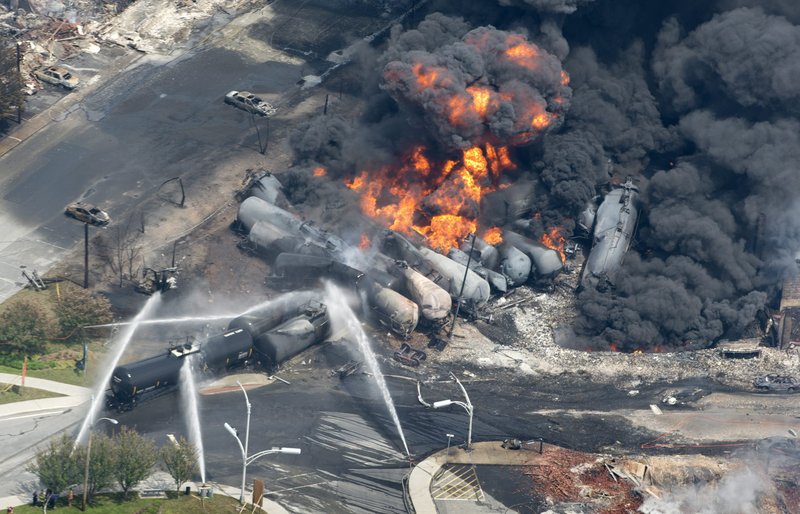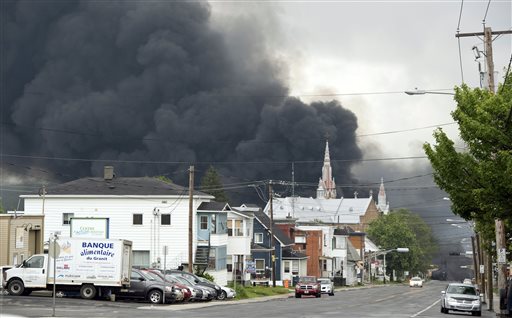When a runaway train derailed in Lac-Megantic, Quebec, early Saturday, a series of explosions flattened the town’s center.
What caused the blasts that left 13 people dead and dozens missing?
Government investigators and railroad officials have yet to say anything about the matter, leaving many to assume that the cause was the 73-car train’s cargo of crude oil.
But Marie-Eve Boucher, who lives near the train yard that was at the center of the disaster, told the Toronto Star that she looked out her window after the ground began to shake and saw flames licking a tank car filled with propane.
She and her husband ran to a nearby shopping mall, about a mile from the downtown, and then heard an “enormous explosion.”
Her account confirms what Kevin Burkholder sees when he studies photographs taken from the air Saturday while fire crews doused the smoldering wreckage.
The mainline track on which the train was traveling remained relatively intact, he said, but a side track, known as a “storage track,” was torn apart by an explosion at the point where the mainline curves, said Burkholder, editor of Vermont-based Eastern Railroad News, an online magazine that covers the industry for rail enthusiasts.
He said it appears that the train derailed at the curve and slammed into railroad cars carrying liquid propane. He said a Lac-Megantic resident, a “rail fan” who monitors activity at the yard, told him that he saw four propane cars Friday on the same storage track.
Burkholder would not name his source, but said the Lac-Megantic resident had given accurate information about train movements in the past.
He said liquid propane is transported under pressure and is more likely than crude oil to create the kind of explosion that destroyed much of downtown Lac-Megantic. Crude oil is not transported under pressure, he said.
Burkholder said aerial photographs show that the vast majority of the tank cars carrying oil remain “intact and solid.”
“It’s very clear that the oil train itself didn’t crash and blow up,” he said. “It’s what it crashed into.”
Burkholder’s analysis makes sense, said Chalmers “Chop” Hardenbergh of Freeport, who edits Atlantic Northeast Rails & Ports, a trade publication.
“Crude oil does not explode,” Hardenbergh said. “Crude oil is not the problem here.”
He said the same explosion might have happened if the train had been carrying any other cargo.
The transportation of oil by rail is drawing close attention as shale oil production outpaces pipeline construction.
The train that crashed Saturday, operated by the Montreal, Maine & Atlantic Railway, was hauling about 50,000 barrels of crude oil, according to the Reuters news service. It was one of about 10 such shipments a month that cross Maine to Saint John, New Brunswick.
The railroad has no lines in southern Maine.
Propane shipments by rail are also increasing. Propane production from natural-gas plants has more than doubled since September 2009 because of an increase in shale gas production.
In New England, the surging domestic supply has sparked unprecedented upgrading and construction of rail terminals and small storage tanks.
CHS Inc., an agribusiness co-op in the Midwest, just opened a terminal in Biddeford that can store 180,000 gallons of propane and move 20 million gallons a year.
On Portland’s waterfront, NGL Supply Terminal Co. LLC recently finished renovating its rail and truck terminal on west Commercial Street.
According to NGL Supply, the terminal has 210,000 gallons of storage, three rail unloading towers and two truck loading bays with a capacity of 131 million gallons a year.
Cynthia Scarano, executive vice president of Pan Am Railways, which delivers propane to both terminals and transports crude oil through southern Maine to New Brunswick, said the railroad is a “common carrier” and transports anything customers want transported.
She said propane, like any gas, will explode under pressure.
“The product itself doesn’t explode,” she said. ” It just burns.”
Tom Bell can be contacted at 791-6369 or at:
tbell@pressherald.com
Send questions/comments to the editors.



